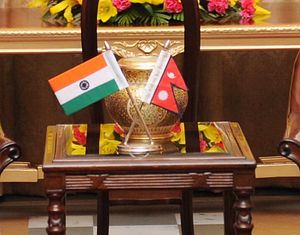Last week, Nepal’s prime minister, Khadga Prasad Oli, arrived in India for a six-day visit. Oli’s visit to India, as I discussed prior to his trip, was primarily intended to normalize an important bilateral relationship that had been derailed over internal social unrest stemming from its new constitution, which was promulgated last year. However, despite spending nearly a week in India and meeting with several senior officials and Indian Prime Minister Narendra Modi, the two sides did not sign a joint statement, setting out a concrete agenda for the future. Indeed, it became apparent during Oli’s time in India that tensions over the constitutional crisis that gripped Nepal for months hadn’t passed.
Is Kathmandu prepared to let bygones be bygones and push ahead with its closest historical partner? Politically, Oli’s hands may be tied. As I described in The Diplomat last fall during the peak of Nepal’s constitutional crisis, the country’s new constitution exposed a rift between the political elites in Kathmandu and historically disadvantaged Madhesi and Tharu groups, who live in the country’s southern plains and have close cultural ties with India. The latter took to protesting after feeling disenfranchised by the new constitution’s provisions for proportional representation and constituency delimitation. In January, the country was pacified after the Nepalese government acquiesced to a crucial amendment that incorporated provisions being demanded by the protesting groups, with India’s backing.
Given the manner in which Nepal’s constitution was amended to satisfy the disaffected groups, who are seen as having close ties to India, many in the Kathmandu elite, close to the prime minister, feel that India inappropriately intervened in Nepal’s internal affairs. Oli, who has a reputation for being an outspoken populist, became prime minister after rallying a broad coalition of smaller political parties in Nepal. His Communist Party of Nepal (Unified Marxist-Leninist) was partly thrust into power after Nepalis became disaffected with what they saw as an excessive accommodation of Indian interests in Nepal by the recently deceased former prime minister, Sushil Koirala, and the Nepali Congress party, which itself has a close historical association with the Indian National Congress across the border.
That Oli’s visit to India wasn’t a great moment of normalization isn’t a surprise. Partly performing for a domestic audience back in Nepal, Oli made the most of his six days in India and extolled the virtues of Nepal’s new constitution. He hardly made any effort to acknowledge the grievances within the country that had brought Nepal-India to a standstill in the fall (though he privately assured India’s foreign secretary that his government would respect the recent amendments). Modi and Oli gave little attention to the de facto blockade of the Nepali border, which Nepal accused the Indian government of engineering as a punitive measure, but India resolutely denied. That the two sides didn’t bring this up is a small positive, but hardly enough to suggest that the Nepal-India relationship is anywhere close to where it stood before the constitutional crisis.
After Oli’s visit, the overall trajectory of the Nepal-India relationship has gone from being strongly downward-trending to moderately upward-trending, but a lot will come down to just how diligent the Nepali government is in making good on the promises it made in January when it adopted amendments to bring the constitutional crisis to a close. Any vacillation or delay will mean that Nepal will lose out on opportunities with India. Despite recent overtures to China and even a short-lived bluff that Oli might have chosen to visit Beijing before New Delhi to convey his displease with India’s handling of the constitutional crisis, the reality is that Nepal continues to need India.

































